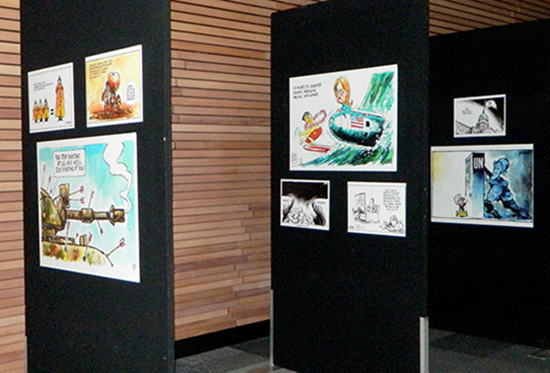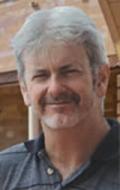
Australia has embarked upon a shift towards a “state of secrecy”.It is also sending mixed messages to the Pacific region on free expression, transparency and good governance, writes Mark Pearson. And from what he has seen over the past seven years as Australian correspondent for Reporters Without Borders, he fears this is an ongoing shift.
I am reluctant to give more ammunition to Pacific leaders who regard Australia as some kind of exemplar in media freedom – in this case a bad example. On the other hand, truths have to be told: in Australia today there are some telling signs that media freedom is on the decline.
To claim Australia is an emerging “secret state”, we’d have to start thinking about what a “secret state” is. What springs to mind when we hear that term?
In the last century or so we immediately think of Nazi Germany, along with Cold War depictions of the Soviet Union. In modern times we look towards the tail end of the Reporters Without Borders (RSF) World Press Freedom Index and see countries like North Korea, China and Vietnam.
Such an index is really a continuum because there is no perfect haven of free expression or press freedom internationally. Every country has some problems, but we would consider those I’ve just mentioned the “secret states”. They get various challengers at the bottom of the list every year – countries like Eritrea and Syria – depending on their circumstances and the regime in power at the time.
I contribute information to the Press Freedom Index. When you look at the lowest-ranked countries you see where the worst is happening – journalists being murdered with impunity.
Australia lost five journalists in Balibo in 1975 and that was a crime of impunity as well. We’ve seen excellent documentaries and a movie about that, but the murders of journalists in the Philippines and elsewhere are on a much larger scale and much more recent.
The developments in Australia pale by comparison. RSF ranked Australia 28th of 180 countries on the index last year – it had dropped two spots. So surely it is ridiculous to call Australia an “emerging secret state”.
Are we at a turning point?
I’d like to emphasise that word, “emerging”, and the continuum. The decline in media freedom can be – as we see worldwide – a “slippery slope”.
We have embarked upon a shift towards a “state of secrecy”. It may stop at some stage but, from what I have seen over the past seven years as Australian correspondent for Reporters Without Borders, I fear it is an ongoing shift.
We must note that people in other Pacific countries like New Zealand and Papua New Guinea are better off constitutionally because Australia has no Bill of Rights and no explicit constitutional protection of free expression or a free media. Any legislative proposal and any court decision is challengeable in countries with that constitutional guarantee of free expression - or where your country is not just a signatory but has ratified a human rights charter.
Australia has only an “implied freedom” that our High Court justices have not clearly defined but have been fine-tuning over recent years. Sadly, it has been evolving the wrong way – and has been read down over many decisions.
They called it an “implied freedom to communicate on matters of politics and government”. In recent cases it has offered very little protection.
For example, a Palm Island activist – an Indigenous man jailed after rioting on the Queensland island over the death in custody of another Indigenous man––was released on parole only a couple of years ago and wanted to make public statements about these issues. Queensland’s parole conditions barred him from talking with the media and his case went all the way to the High Court.
The High Court affirmed Queensland’s power to stop him communicating on matters of public interest while on parole. If an implied freedom to communicate on matters of government and politics does not allow someone to do that, there is something wrong with the system.
Markers of decline in media freedom
So why am I sensationalising a decline in free expression in Australia? In its first year in office, the Abbott government has:
- withheld information on the fate of asylum seekers
- initiated major budget cuts to public broadcasters ABC and SBS
- secured a “super injunction” on reporting of court proceedings that might damage its international relations
- ramped up surveillance powers of national security agencies
- enabled agencies to ban reporting of security operations
- proposed increased jail terms for leaks related to security matters
- moved to stop not-for-profit organisations advocating against government policy in their service agreements
- abolished the Office of the Information Commissioner, promising tardy FOI appeals
- proposed what is effectively a tax on telcos to cover the cost of new surveillance measures.
The RSF survey starts with the deaths, jailing and physical intimidation of journalists. Then it gets into legislative measures against journalists. That’s the main area of concern in Australia.
You can see across a range of often quite politicised areas moves to shut down public debate, to deprive media and certainly public media of the resources necessary for investigative journalism and to shift away from transparency generally.
This is not simply an Abbott Liberal-National conservative government thing. Governments have a natural inclination to control public debate. If they have the resources, mechanisms and opportunities available to them they will do so.
Australia’s previous government wanted a new mechanism of media accountability because they were copping so much unfair criticism from the Murdoch press. Their knee-jerk reaction was to try to install a regulatory mechanism that any government of whatever political persuasion could use in the future.
Information control by the state
All these measures undermine the role of Australia as a beacon of free expression in the Pacific. The suppression of information is one big area. These include new powers to suppress reporting of court proceedings.
Some of you may have heard of the major suppression order the government won on the grounds that evidence in a case might damage Australia’s international relations. I’m not allowed to talk about that but WikiLeaks has exposed that order relating to corruption and certain political leaders in the region.
The government has adopted various policies on the suppression of names, some of long standing. The suppression of mental health patients’ names makes it very hard to expose wrongful detention of people with mental health conditions. Asylum seeker children – for all sorts of reasons, some of which you might accept – go by acronyms and their faces cannot be shown in the media.
Even sections of the new edition of our media law textbook are being withheld at the printer because they are subject to a suppression order in one state at the moment.
We did have one journalist jailed last year. Derryn Hinch defied a suppression order related to a controversial murder trial, refused to pay his A$100,000 fine and was jailed for 50 days. No matter what you think about that colourful media figure, there are good arguments why he perhaps should have been allowed to say the things he did say.
Big Brother laws in the name of security
Surveillance and intimidation are on the increase. Whistleblowers are being snared by the various surveillance laws that are in place and the technologies available to detect them. They are being found and they are going to court.
New laws being passed under the anti-terror regime give the government access to all of Australia’s IT networks with a single warrant. Telcos are going to be expected to retain metadata – your computer and telephone data and IP address and technical details – for two years so it is available to investigators. Facebook has acceded to more than 60 percent of more than 600 Australian government requests for that kind of data over the first six months of this year.
In security, we have had three major tranches of new anti-terror laws in Australia this year. Journalists face a five-year jail sentence for reporting on any activity deemed to be a special intelligence operation.
In the area of spin, the media finds it very hard to gain access to and report upon asylum seekers – stories that are really an international human rights issue. At least twice in recent times, senior public servants – a defence force chief and the immigration department secretary – have essentially heavied politicians and bloggers over what they have been saying and writing.
What are the lessons for the region?
Australia has at least purported to be some sort of exemplar to the region of media freedom, transparency and good governance. Millions of dollars have been spent on aid projects. Many people including myself have travelled, consulted, trained or studied under AusAID contracts.
PACMAS is an $11 million project. There is a $3 million Transparency International project. Yet AusAID continues to have a gag clause in the contracts of the people running them.
Australia might not be a secret state like North Korea but it is certainly moving towards a “state of secrecy”. It is doing so with no constitutional brake on censorship.
Australia is sending mixed messages to the region on free expression, transparency and good governance. A perfect storm of factors has contributed to this including the rise of spin – our country now has more PR practitioners than journalists – the demise of traditional media and its budgets to defend and lobby for media freedom, and the political capital available to parties of all political persuasions in getting tough on terrorism and immigration.
My great fear is that freedom of the press as a 19th and 20th-century notion sadly has entered a period of long-term decline.
This is adapted from an address Professor Mark Pearson gave at the Pacific Journalism Review 2014 conference in Auckland last week. It was first published by The Conversation.
This work is licensed under a Creative Commons Attribution-NonCommercial 3.0 New Zealand Licence.

PJR2014
Media freedoms, human rights and doco feature in PJR conference
Grim reminders of price paid by journalists in Asia-Pacific
PMC, RSJ call for action on Ampatuan massacre trial
Fiji media still face 'noose around neck' challenges
Max Stahl's livestreaming
Walter Fraser's opening speech
Max Stahl tells of Santa Cruz massacre on Radio NZ's Sunday
Green MP calls for 'rigorous documentation' Pacific sequel to Hot Air film
PJR2014 on Storify
PJR website




